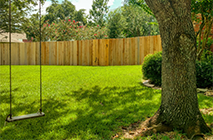
Backyard Bugs Identification & Control
It is no secret that bugs inhabit our yards. In fact, insects in nature like butterflies and ladybugs are considered beneficial and a true wonder to behold. However, some backyard crashers cannot be tolerated. Mosquitoes, ticks, stinging insects and other backyard insects are a few of the culprits – and they can quickly ruin any outdoor fun. If not properly addressed and controlled, these backyard bugs can become an indoor issue as well.
Backyard Insect Identification
 Mosquitoes and Ticks in the Backyard
Mosquitoes and Ticks in the Backyard
Some of the most common outdoor pests, mosquitoes and ticks can plague any yard, especially those near wooded areas. Primarily feeding on humans, these bugs are sure to make an appearance at any backyard barbecue. Capable of spreading debilitating diseases such as West Nile virus and Lyme disease, mosquitoes and ticks pose a far greater threat than just their bites.
Stinging Insects in the Backyard
A number of stinging insects such as yellowjackets, wasps and hornets can wreak havoc on any outdoor activity. The National Pest Management Association reports that stinging insects send more than half a million people to the emergency room every year. These pests build nests in a variety of places around the house, such as overhangs, eaves, the underside of porches and decks, in trees and along fence lines, and in ground nests around the yard.
Ants in the Backyard
There are more than 700 ant species found in the U.S., so it is not surprisingly that homeowners may stumble upon an ant hill or two in the backyard. These backyard bugs are social insects that typically live in underground colonies. Many types of ants like Argentine ants and pavement ants build bests beneath plants and sidewalks. If you live in the southern United States, you are more likely to come in contact with red imported fire ants (RIFA), especially in landscaping in the backyard. Fire ants will sting if their nest is disturbed, and the sting can be quite painful.
Scorpions in the Backyard
While residents in the northeastern part of the country need to worry about blacklegged ticks, those who live in the arid southwest should be on the lookout for scorpions, especially in the backyard. Scorpions prefer dry habitats and will dig burrows in the soil for shelter. During periods of hot weather, scorpions may enter homes through wall voids. Scorpions are known to sting as a defense mechanism or to kill prey. Some scorpion species possess dangerous venom that can be fatal.
Fleas in the Backyard
Attracted to warm-blooded hosts, fleas typically make their way to yards in search of people and pets. They can also transport themselves on rodents and other wild animals, quickly making their presence known upon arrival. Although they have a short lifespan of about 100 days, females can produce up to 400-500 offspring during that time.
MORE FROM THE NATIONAL PEST MANAGEMENT ASSOCIATION
 Why Insects are Attracted to the Yard
Why Insects are Attracted to the Yard
Simply put, yards are a natural habitat for many bugs and insects. More than anything, pests are attracted to the outdoor human activity that this part of the property hosts. Full of grass and tall weeds, yards provide blood-sucking pests like ticks and fleas easy access to hosts such as pets and people. Fleas can also end up in the yard by hitching a ride on rodents and other wildlife, as well as on shoes, picnic blankets and clothing.
Eaves and overhangs, as well as the underside of decks and porches, provide ideal sheltered locations for stinging insects like yellowjackets, wasps and hornets to build their nests. Additionally, they are attracted to exposed food and open garbage cans, along with sweet-smelling fragrances like perfume, cologne, and even some lotions and sunscreens.
Ticks can frequent yards in search of hosts – and yards close to wooded areas are at an even greater risk for tick encounters. Aside from feeding on people, mosquitoes can use yards for reproductive purposes, breeding in areas of standing water. Mosquitoes only need a half an inch of stagnant water to reproduce, so many items in the backyard provide ideal breeding grounds, such as bird baths, baby pools, grill covers and potted plants. Yards also provide the harborage sites scorpions need to thrive in arid environments.
Tips for Backyard Bug Control and Prevention
Whether you are hosting a backyard summer soiree, playing on the swing set or tending to the garden, practicing a number of pest prevention methods can help assure your outdoor safety and satisfaction. In general, when spending time outdoors, apply an insect repellent containing an EPA-registered ingredient, such as DEET, picaridin or oil of lemon eucalyptus. Also, consider wearing long clothing and tucking pants into socks, especially if spending time in higher grass. To prevent mosquitoes from breeding in your yard, eliminate standing water by unclogging gutters and routinely changing the water in birdbaths and kiddie pools.

Seal and cover any trash with tight lids, making sure to place cans far from primary entertaining spots. If you are cooking out in the yard, keep yellowjackets, wasps and hornets away by covering all food when outside. If a wasp or yellowjacket does fly on by, do not swat at it as this will only further provoke an attack. Instead, slowly walk away from the area, and the insect should retreat; however, stinging insects may become more aggressive in the fall when populations are at their peak.
Properly grooming the yard will also help with outdoor pest prevention, since overgrown brush and weeds can house and hide backyard bugs like ticks and mosquitoes. Keep shrubbery trimmed and mow the lawn on a regular basis. Remove stones and landscape timbers from the property, and store firewood at least twenty feet from the home and five inches up off the ground. Furthermore, seal exterior housing cracks, install screens on windows and doors, and inspect both pets and people before coming inside to keep these pests outside where they belong.

Threats Posed by Backyard Insects
Aside from their unwelcoming presence on our property, backyard insects can pose a number of health threats. Fleas can transmit a number of diseases to people and pets through their itchy bites, as well as cause allergic reactions. Stinging insects, like wasps and hornets send over half a million people to the emergency room every year. Those with allergies are at the most risk, yet a swarm can threaten anyone. Ticks can transmit a number of dangerous diseases such as Babesiosis, Lyme disease, Rocky Mountain spotted fever and Powassan virus. Just as threatening, mosquitoes are responsible for spreading West Nile virus, Zika virus and a host of other diseases. Let’s not forget about scorpions – they will sting in defense. If stung by a scorpion, humans may experience mild symptoms similar to that of a wasp sting like localized swelling and a burning sensation. There are, however, a handful of scorpion species like the Arizona bark scorpion that can deliver fatal stings.
How to Get Rid of Backyard Insects
It is almost impossible to escape insects when spending time outside, so make sure to take all the necessary precautions to avoid them as best you can. If you are concerned about problems in your yard, call a licensed pest control professional for help. A qualified professional will conduct an inspection of the yard to identify the source of the problem and recommend a proper course of treatment.













